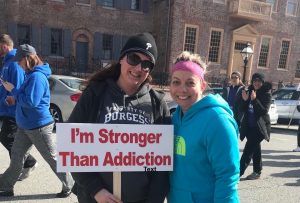Get Involved

 Become a Thought Partner
Become a Thought Partner
Partner with us to produce thought leadership that moves the needle on behavioral healthcare.
 Other options to get involved
Other options to get involved

Thank you!
We received your information and will be in contact soon!
Get Involved

 Grantmaking
Grantmaking
We fund organizations and projects which disrupt our current behavioral health space and create impact at the individual, organizational, and societal levels.
 Participatory Funds
Participatory Funds
Our participatory funds alter traditional grantmaking by shifting power
to impacted communities to direct resources and make funding decisions.
 Special Grant Programs
Special Grant Programs
We build public and private partnerships to administer grant dollars toward targeted programs.
 Program Related Investments
Program Related Investments
We provide funds at below-market interest rates that can be particularly useful to start, grow, or sustain a program, or when results cannot be achieved with grant dollars alone.
Get Involved

 Tia Burroughs Clayton, MSS
Tia Burroughs Clayton, MSS
Learning and Community Impact Consultant
Add some text here
 Alyson Ferguson, MPH
Alyson Ferguson, MPH
Chief Operating Officer
Contact Alyson about grantmaking, program related investments, and the paper series.
 Samantha Matlin, PhD
Samantha Matlin, PhD
Senior Learning & Community Impact Consultant
Contact Samantha about program planning and evaluation consulting services.
 Caitlin O'Brien, MPH
Caitlin O'Brien, MPH
Director of Learning & Community Impact
Contact Caitlin about the Community Fund for Immigrant Wellness, the Annual Innovation Award, and trauma-informed programming.
 Joe Pyle, MA
Joe Pyle, MA
President
Contact Joe about partnership opportunities, thought leadership, and the Foundation’s property.
 Bridget Talone, MFA
Bridget Talone, MFA
Grants Manager for Learning and Community Impact
Add some text here
November is National Family Caregivers Month and a time to recognize and appreciate unpaid caregivers for everything they do. This month, Alyson Ferguson, Chief of Operating Officer at the Scattergood Foundation, reflects on her role as a family caregiver.
Being a caregiver for a family member or loved one with a mental health and/or substance use disorder is a special and unique responsibility. You may choose the role, or it may be thrust upon you. To be honest, it is exhausting, scary, and all-consuming. But it can also be rewarding, and bring you closer to your loved one than ever before.
On September 13, 2020, my sister-in-law celebrated two years of sobriety. She is an amazing person and an inspiration to all in her life. Her journey to sobriety was long, hard, and at many times circular. She experienced relapses, provider changes, inpatient stays, partial hospitalization, recovery homes, and more. The only thing during her active use period that didn’t change was the constant sense of worry from her brother and me.
 I firmly believe in the saying, “You will worry yourself to death.” I felt the effects of worrying; I didn’t sleep, I was irritable and depressed. I couldn’t find joy in my typical pleasurable activities. While at sporting events, on vacation, or having family meals, I would find myself wishing my sister-in-law was there. When she was there, I was nervous about saying something or doing something to trigger her and cause a relapse. I felt myself on the path of worrying myself to death.
I firmly believe in the saying, “You will worry yourself to death.” I felt the effects of worrying; I didn’t sleep, I was irritable and depressed. I couldn’t find joy in my typical pleasurable activities. While at sporting events, on vacation, or having family meals, I would find myself wishing my sister-in-law was there. When she was there, I was nervous about saying something or doing something to trigger her and cause a relapse. I felt myself on the path of worrying myself to death.
After a few months, I found a few coping mechanisms that helped:
- Prioritizing regular exercise. You need to be healthy to help manage a family member’s health. Exercise helps to clear your mind and can be a positive emotional release.
- Setting boundaries. It is ok to say no or to agree to do things on your terms. It is important for you to put your schedule and life first. I was once told that the difference between enabling and supporting, is the boundaries you put into place.
- Letting yourself cry. Similar to exercise, a good cry can release a lot of tension and stress.
- Finding your peer caregivers. Building formal structures for peer support with your family and friends can be really helpful. Caregiver support groups like Al-Anon or NAMI’s Family to Family are also great resources to build connections with other caregivers.
- Sharing about your role as a caregiver. Sharing your story can be liberating. Once you do, you will be surprised how other people feel comfortable sharing their stories. Caregivers are everywhere: your work, your school, your existing friend circles, everywhere.
- Seeking professional help. If your support system is inadequate or overwhelmed, there is no shame in going to therapy as an individual or as a family.
- Practicing Acceptance. You can (and likely will in the beginning) spend a tremendous amount of energy dwelling on things you can’t change and asking questions with no clear answers. Focus on the things you can control, like how you react to a situation.
Being a caregiver is like playing a team sport. You must: practice your coping skills, train your mind and body for the endurance challenge, rely on your teammates, and know when you need to sit on the sidelines.













